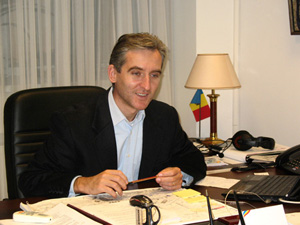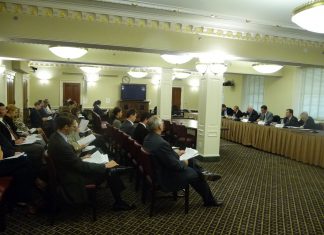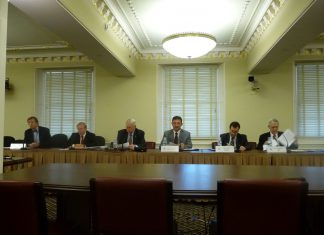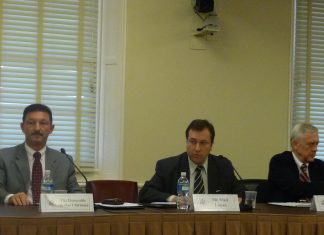Joint Statement, EU – Republic of Moldova Cooperation Council Brussels, 21 December 2009. Swedish...
The parties agreed to continue their efforts to bring the Republic of Moldova (hereafter referred to as Moldova) closer to the EU, acknowledging Moldova's European aspirations. They discussed the internal developments in Moldova and agreed on the importance of the ambitious reform-oriented agenda and of a stable political, social and economic situation in the country.
Statement by Mr. Iurie LEANCĂ, Deputy Prime Minister, Minister of Foreign Affairs and...
[pdf-embedder url="http://www.ape.md/wp-content/uploads/public/publications/912154_en_alocutiune_i.doc
Chairman Kerry Urges Cooperation After Election In Moldova. Moldova Foundation. 30.07.2009.
Senate Foreign Relations Committee Chairman John Kerry released the following statement today in response to the historic election in the Republic of Moldova that may ultimately result in the unseating of the last governing Communist Party in the former Soviet Union
Message for the Republic of Moldova from the Minister of Foreign Affairs of Poland...
In order to send a clear signal of support for democratic tendencies and proeuropean attitude demonstrated by the Moldovan society as well as the political class, prior to the elections on 29 July 2009, Radosław SIKORSKI, the Polish Minister for Foreign Affairs is to undertake mission to the Republic of Moldova on 24 July 2009. This mission has been given full consent from the EU Swedish Presidency and the Greek OSCE chairmanship.
U.S. Senator Ben Cardins statement on Moldovan parliamentary elections. Moldova Foundation. 13.07.2009.
U.S. Senator Ben Cardin (D-MD), Chairman of the Commission on Security and Cooperation in Europe (U.S. Helsinki Commission), made the following statement on the upcoming repeated elections in Moldova
2950th GEERAL AFFAIRS Council meeting: Council conclusions on the Republic of Moldova, Luxembourg, 15...
"The Council recalls its strong commitment to further deepening the relationship between the EU and the Republic of Moldova, on the basis of shared values and principles. The Eastern Partnership, launched in Prague on 7 May as a specific Eastern dimension of the ENP,provides a new, ambitious framework for taking the EU-Republic of Moldova relationship to a new level. The Council is committed to enhancing EU support for further political and economic reforms in the Republic of Moldova, aimed in particular at strengthening democracy and good governance, the rule of law, freedom of the media and respect for human rights and fundamental freedoms. The Council welcomes in this context the Commission's intention to launch a comprehensive package for democracy support in the Republic of Moldova.
European Parliament resolution of 7 May 2009 on the situation in the Republic of...
European Parliament resolution of 7 May 2009 on the situation in the Republic of Moldova The European Parliament ,și having regard to its previous resolutions on the Republic of Moldova, in particular that of 24 February 2005 on the parliamentary elections in Moldova(1) , as
Statements of the OSCE, Council of Europe, European Union, Romania, Ukraine, Russia and the...
OSCE1.Post-election interim report on the 5 April 2009 parliamentary elections in the Republic of Moldova. 17.04.2004.2.OSCE Mission to Moldova condemns post-election violence and appeals to all sides for restraint. 07.04.2009.3.Statement of preliminary findings and...
Declaration of the experts community regarding the escalating social and political situation in Moldova...
Expressing our concern regarding the worsening social and political situation after April 5, 2009 parliamentary elections and, being worried that inadequate interpretations of these events serve as justification for decisions and actions that threaten to further polarize the Moldovan society, we declare:
DECLARATION BY THE EUROPEAN COUNCIL ON THE EASTERN PARTNERSHIP. Council of the European Union,...
Promoting stability, good governance and economic development in its Eastern
neighbourhood is of strategic importance for the European Union. The EU therefore has a
strong interest in developing an increasingly close relationship with its Eastern partners,
Armenia, Azerbaijan, Belarus, Georgia, the Republic of Moldova and Ukraine. The European
Union's proposal for an ambitious Eastern Partnership to be established with these countries
serves this objective.
STATEMENT by Mr. Andrei STRATAN at the Closing Session of the 16th OSCE Ministerial...
We call once again on all involved actors to engage actively in the discussions for the substitution of the military contingents in the Security Zone by a multinational civil mission under an international mandate. We reiterate our position concerning the full, early and unconditional withdrawal of the all military forces and ammunition of the Russian Federation from the territory of the Republic of Moldova in compliance with the obligations undertaken in the framework of the OSCE Summits. This will provide the necessary ground for the ratification by the Republic of Moldova of the Adapted CFE Treaty.
STATEMENT by H. E. Mr. Andrei STRATAN, Deputy Prime Minister, Minister of Foreign Affairs...
We fully share the concerns expressed by our colleagues about the critical situation of the Adapted CFE Treaty which we all consider it as a cornerstone of the European security. Withdrawal of the Russian military forces and ammunition from Moldova, in compliance with the obligations undertaken in the framework of the OSCE Summits, must take place unconditionally, completely and transparently. We highly appreciate the continued engagement of OSCE Member States that have contributed to the OSCEs Voluntary Fund for Moldova to support the withdrawal process.
Joint Statement Concerning Forthcoming Parliamentary Elections in the Republic of Moldova.
We, the Heads of Missions of EU Member States, the Delegation of the European Commission and the European Union Special Representative's office residing in the Republic of Moldova,- with reference to paragraph 2 of...
”Who’s Next? The Russian Initiative in Moldova”. Statement by Ambassador William H. Hill at...
With respect to Moldova in 2008, the absence of a solution to the Transnistrian question will be better than a bad solution that cripples the country's chances for reform and integration into Europe as a whole. For any settlement to succeed, Russia must be a part - but so must the rest of Europe and the North Atlantic community, i.e. the EU and US.
Statement by Nicolae Chirtoaca, Ambassador of Moldova to the United States at the briefing...
It is an honor and a privilege to appear before you today to discuss the issues related to democracy development in my country the Republic of Moldova fro mthe perspective of approaching 2009 parliamentary elections and taking into consideration the changing geopolitical environment in the East of Europe caused by the recent Georgia crisis that has a direct impact on the settlement of the so called "frozen conflcts" in the ex-Soviet space.
Statement by Vlad Lupan, Independent Expert from Moldova at the briefing held by the...
Thank you for the possibility to share my views about the democracy in Moldova, as well as for the concern that the Commission shows for my country. I hope this extremely encouraging attitude continues and the Commission will organize a hearing on Moldovan matters ahead of 2009 elections. I would also like to thank the Moldova Foundation based in Washington for assisting me in attending this session. I do not intend to speak about the comparative successes of the current Government versus existing problems, as the Government has the opportunity to promote its point of view extensively through the existing network of official visits and meetings. The civil society has fewer possibilities. Therefore I will go to the point and focus mainly on those concrete shortcomings that present a serious concern for democracy in Moldova.
The Position of a Group of Experts Regarding the Impact of the Georgian Crisis...
The armed conflict between Russia and Georgia has produced a major political-military crisis capable of generating profound transformations in the system of international relations. Rapid and fundamental degradation of institutional cooperation mechanisms and relations between Russia, on the one part, and the European Union and NATO, on the other, marks the beginning of a new period of confrontation, with serious implications for regional security and stability. The Georgian crisis threatens stability of many post-Soviet countries that Russia unilaterally perceives as being part of its paramount sphere of interests. These countries face separatist conflicts that have been initiated and supported politically, economically and militarily by the Russian Federation. The armed conflict between Georgia and Russia has clearly demonstrated the role of Russia as a party in these conflicts and highlighted the limitations of the existing system for ensuring stability in the frozen conflict zones.
Speech by U.S. Charge d’Affaires on July 4, 2008
Perhaps, these commonalities explain the affinity between the United States and Moldova, and provide a basis for Americas continued interest in the future of Moldova. Perhaps, they explain why Americans, both through our government and as private citizens, maintain partnerships and friendships with the Moldovan people and support your progress along the path of democratic development.






